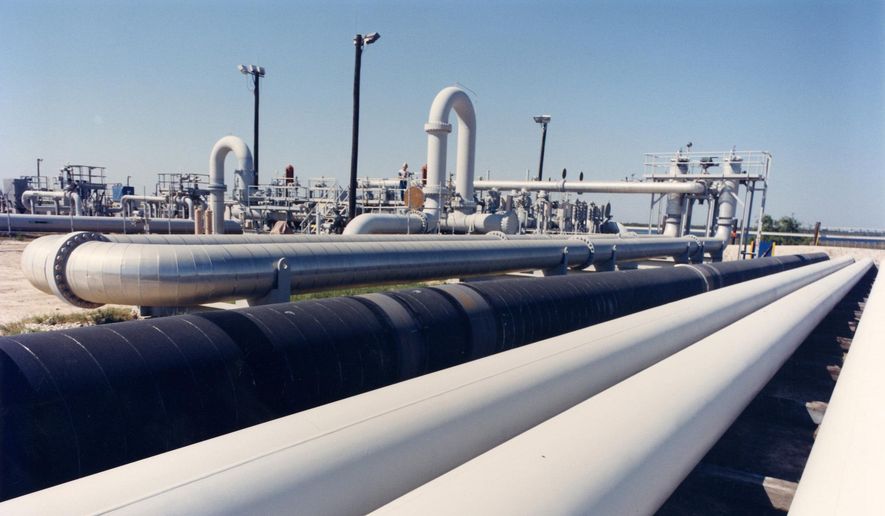President Biden on Thursday took the unprecedented step of releasing 1 million barrels of oil per day from the U.S. Strategic Petroleum Reserve, his most aggressive bid yet to soothe Americans who are seething about soaring gasoline prices.
He plans to release about 180 million barrels from the reserve over six months. That would bring the depleted Strategic Petroleum Reserve to roughly 388 million barrels, its lowest level since March 1984.
“The action I’m calling for will make a real difference over time, but the truth is, it takes months, not days, for companies to increase production. That’s why the next part of my plan is so important,” Mr. Biden said.
He said the move could reduce what Americans pay at the pump from 10 cents to 35 cents a gallon, but he was vague about when consumers could see that decrease.
Energy market analysts were skeptical that the influx of oil over the next six months would have a significant, long-lasting impact on record-high gas prices. One million barrels, after all, is a drop in the bucket.
One million barrels per day is about 5% of the 20 million barrels of oil that the U.S. consumes each day and 1% of the roughly 100 million used globally each day.
On the news of Mr. Biden’s plan, oil prices fell. West Texas Intermediate, the U.S. benchmark, dropped more than 7% to about $100 a barrel. Brent Crude fell roughly 5.4% to around $107.
Dipping into the Strategic Petroleum Reserve, typically used during emergencies such as natural disasters, to try to lower prices underscores the political pressure on Mr. Biden and other Democrats. The midterm elections are just months away, and polls show that voters blame Mr. Biden and his party for high gas prices and inflation at a 40-year high.
“High gas prices are a political nightmare. Democrats are staring at the midterms,” longtime oil markets analyst Dan Dicker said in an interview. “It can drive prices down. How much? My guess is not a whole bunch. It won’t fundamentally make a difference in demand. In the short period, it can scare the bejesus out of traders.”
Democrats who have accused Big Oil of price gouging at the pump voiced doubts that savings from the extra oil would reach consumers.
“Supply usually lowers cost. We’ll just see how that is reflected,” said House Speaker Nancy Pelosi, California Democrat.
The White House described the measure as a stopgap to get to the end of the year when domestic production is expected to ramp up. Mr. Biden acknowledged “there is no firm answer” as to when gas prices will fall, though he predicted they will drop “fairly significantly.”
SEE ALSO: Biden release of oil reserves to blunt gas prices draws skepticism from friends and foes
This is the third time in recent months that Mr. Biden has dipped into the strategic reserves. He released 50 million barrels in November as energy prices rose sharply and another 30 million in March after Russian forces invaded Ukraine and the U.S. banned Russian energy imports. Both actions sent prices skyrocketing.
Neither of the previous releases had much impact on gasoline prices.
Presidents George W. Bush, Bill Clinton and Barrack Obama ordered releases from the U.S. strategic reserves, all with mixed results.
Research suggests that tapping the strategic reserves rarely produces dramatic changes in gasoline prices. A 2019 study by the Federal Reserve Bank of Dallas concluded that releases from the strategic reserves from 2001 to 2005 showed moderate decreases in oil prices.
Republicans have hammered Mr. Biden for months about rising gas prices, making it clear that will be their political cudgel against Democrats in the midterm campaigns.
Republicans dismissed the release as a “political gimmick.” They blame Mr. Biden for creating the crisis with climate change policies such as pausing new drilling leases on federal land and otherwise discouraging fossil fuel production.
“These desperate moves are not the solution,” said Sen. Steve Daines, Montana Republican. “Biden needs to stop appeasing the woke green activists and get oil and gas leases going again.”
Mr. Biden blamed soaring prices on Republicans, U.S. oil companies and Russian President Vladimir Putin.
The White House said Republicans contributed to the crisis by blocking Mr. Biden’s roughly $1.75 trillion spending bill that would have promoted green energy alternatives to fossil fuels. Officials said the spending would have lowered inflation with government-subsidized child care, health care and education.
Many economists disagreed and said more government spending would fuel inflation.
The American Petroleum Institute, a lobbying firm for the oil and natural gas industry, said Mr. Biden’s action may provide some short-term relief but is far from a long-term solution.
“The best thing the White House can do right now is to remove barriers to investment in American energy production and infrastructure,” API President and CEO Mike Sommers said.
In a jab at energy companies, Mr. Biden called for a policy to charge oil companies for unused wells on public lands. A senior administration official said oil companies were “hoarding without producing” to exploit the lack of supply.
The Strategic Petroleum Reserve was created as an emergency, stopgap measure in the face of severe disruptions to the global oil supply. When the U.S. pulls barrels from the reserve, it selects the amount of crude oil to sell and then auctions it off to the highest bidder, which is usually an oil company.
Barrels also can be released under an exchange arrangement with oil companies. The barrels would be viewed as “a loan” from the government to an oil company to be repaid with additional barrels viewed as interest.
• Jeff Mordock can be reached at jmordock@washingtontimes.com.
• Ramsey Touchberry can be reached at rtouchberry@washingtontimes.com.




Please read our comment policy before commenting.